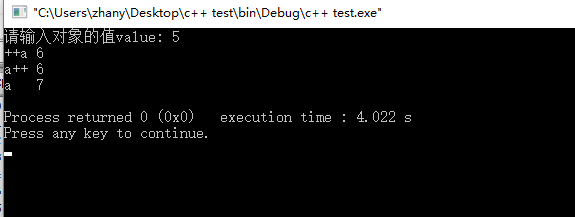自增运算符重载
//前置++是把对象加1后再给你用。
//后置++是把对象的值借你用,再把对象本身加1。
1.作为成员函数:
前缀自增运算符
test operator++() //前置运算符
{
this->value++;
return *this;
}后缀自增运算符
test operator++(int) //后置运算符
{
test temp(*this); //将对象的值赋给临时建立的对象
this->value++;
return temp; //返回临时建立的对象,
}2.作为友元函数:
先要在类内声明友元函数
friend test operator++(test& a);
friend test operator++(test& a,int);test operator++(test& a) //前置运算符
{
a.value++;
return a;
}
test operator++(test& a,int) //后置运算符
{
test temp(a);
a.value++;
return temp;
}
代码:
#include <iostream>
#include <string>
using namespace std;
//前置++是把对象加1后再给你用
//后置++是把对象的值借你,再把对象本身加1
class test
{
int value;
public:
test():value(0){} //无参构造函数
test(int n):value(n){} //有参...
friend ostream& operator<<(ostream& output,test a); //重载插入运算符
friend istream& operator>>(istream& input,test& a); //重载提取运算符
test operator++() //前置运算符
{
this->value++;
return *this;
}
test operator++(int) //后置运算符
{
test temp(*this);
this->value++;
return temp;
}
};
ostream& operator<<(ostream& output,test a)
{
output<<a.value;
return output;
}
istream& operator>>(istream& input,test& a)
{
cout<<"请输入对象的值value: ";
input>>a.value;
return input;
}
int main ()
{
test a;
cin>>a;
cout<<"++a "<<++a<<endl;
cout<<"a++ "<<a++<<endl;
cout<<"a "<<a<<endl;
return 0;
}


 浙公网安备 33010602011771号
浙公网安备 33010602011771号